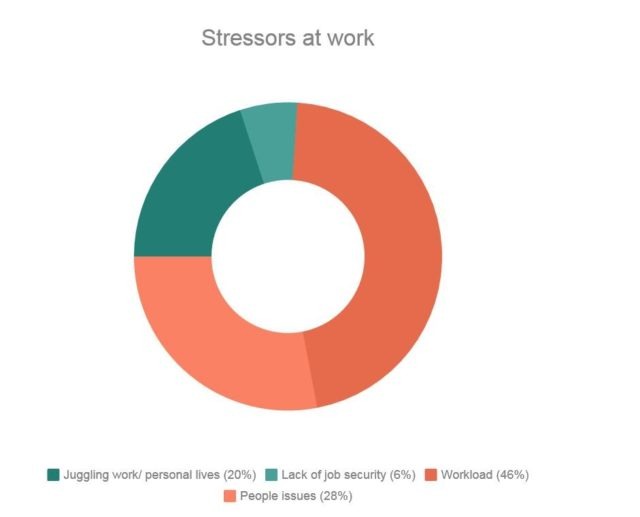Many of us have been stressed at work at some point, some of us more than others. We live in a world that is very much focussed on work and the balance of personal life can be negatively skewed. Have you found yourself returning home from a long day and still feeling like your brain is buzzing about work projects or things you need to deal with tomorrow?
“In 2015/16 stress accounted for 37% of all work related ill health cases and 45% of
all working days lost due to ill health.” – Source: HSE.
The graph below shows the four main stressors employees feel at work:

Sometimes we don’t even know when we are stressed until someone observes your behaviour or you start to feel unwell and take time off work. Achieving a balanced lifestyle and maintaining a healthy relationship with work is increasingly on everyone’s agenda. Here are a few ways to create work-life balance:
Have some ‘Me Time’
In the UK, we work the longest hours in Europe so make sure you are taking at least 2 hours per week to have some ‘me time’ – start reading a new book you have been wanting to open, have a bath, watch a film or do some meditation.
Make time for …. Exercise
Any activity that raises your heart rate or makes you sweat will massively lift your mood, increase energy, sharpen focus, and relax both the mind and body. Walking, running, dancing etc.—is especially soothing for the nervous system. Try to get at least 30 minutes of activity on most days. This can be done during your lunch break or after work – park your car further away or go for a walk after dinner.
Don’t Skip Sleep!
The better rested you are, the better equipped you’ll be to tackle your job responsibilities. The key to getting the best quality sleep is going to bed and waking up at a similar time every night during the week. Switching off screens an hour before bed will increase the melatonin production which is the chemical that allows you to fall sleep.
Prioritise and Organise
Trying to create a work /personal life balance can be very tricky, so making sure you prioritise and organise that balance you can make sure the work doesn’t take over. Write a list/keep a diary – schedule/don’t organise too much in your week.
The commercial benefit of organisations working to reduce the stress levels of their employees is obvious. Reducing illness caused by stress, increasing productivity and sense of wellbeing will impact upon the culture, loyalty and behaviours exhibited by employees. Communication in the business is always the starting point in achieving this, enabling honesty and openness around wellbeing conversations.
One of our recent HR Heads Breakfast forums focused on stress and employee wellbeing within the workplace and our guest speaker Sally Hemmings is considered a leading voice in this area. If you want to discuss this topic further please don’t hesitate to speak with us and we can connect you with Sally.

